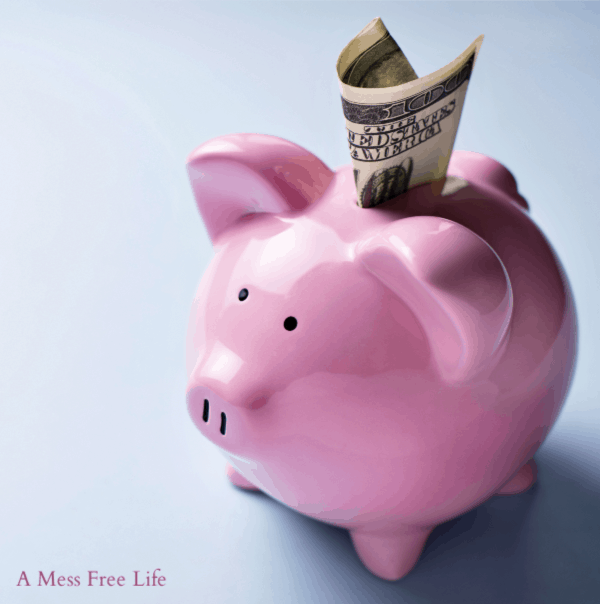A Mess Free Life may collect a share of sales or other compensation from the links on this page.
Well, it’s time to avoid that situation by getting these 7 bank accounts every family needs to establish right now. I know, you can’t afford to put all that money aside at once. That’s okay. Figure out what you can put aside in your budget for saving, total, for the month, then divide it up between the 7 bank accounts your family needs to establish.
Depending on how much you can save and how soon you’d like to have certain accounts established, you can also choose to save towards one goal at a time. Just put all your monthly savings toward one savings fund until you reach your goal then start on the next.
Even with just a little bit at a time, you’ll be surprised at how fast the savings grow.
If you really want to establish your savings accounts quickly, take on a part-time job or start a side business temporarily. You don’t need to do it for the rest of your life (unless you really enjoy it and want to) but the extra money you earn over a year can significantly build your savings accounts without having to cut back any more than you already are.
Table of Contents
FREQUENTLY ASKED QUESTIONS
The biggest question besides ‘how many accounts should I have’ is hands down is “Does having all these accounts hurt my credit, cost me extra or make my life more complicated?”
The straight answer is no.
Well, at least it shouldn’t.
It won’t hurt your credit score unless you get into more debt and don’t pay your bills in a timely fashion.
And believe it or not, if you follow the system, it actually makes your life a whole lot less complicated. It really simplifies your life in many ways.
As for costing more. Most banks nowadays pay you to open up accounts. If your bank doesn’t, change banks and find one that does.
The second question I get asked is “How do you track seven different accounts?”
I have all my accounts with Capital One. When I open my dashboard all my accounts show up and give me a total of what’s in each account. Your best bet is to do something similar. Don’t go opening up accounts in 7 different banks all over town. Way too complicated.
Just open them up in one bank that has online capacity to make it as easy as pie for you. That’s why I love Capital One so much. It’s easy and simple and everything is in one place.
Now that the questions have been handled, let’s get to the actual accounts.
Here are 7 essential savings accounts you should establish and start to build now to make life a little easier when you need them.
HOW MANY BANK ACCOUNTS SHOULD I HAVE?
EMERGENCY
Unfortunately, emergencies don’t give you any advance notice. You don’t usually find out months in advance that you’re going to lose your job, or your refrigerator is going to break, or you’re going to trip and fall, breaking your ankle. Instead, you need to plan in case something happens, and then be pleasantly surprised when everything works out fine.
Your emergency fund should have no less than $1,000, which would cover most unexpected expenses. However, depending on your job, a healthier emergency fund is not a bad idea. Consider how long it would take you to get a new job if you were to unexpectedly lose yours. Are you in a field where jobs are plentiful and you can be back at work within a month? Then you should have at least one month’s salary set aside.
But if you’re in a more specialized field where it could take you several months and maybe even a move to find a new job, your savings should be more substantial. Closer to six months’ salary.
An emergency fund would have helped me significantly when I lost my job and almost lost my home. Instead of struggling like I did for several months, that emergency fund would have been the cushion I needed to get back on my feet quickly.
Planning for an emergency will help you sleep much better, knowing you’ll be fine if something unexpected happens.
SAVINGS
Retirement may seem like a long way off, but it comes faster than you imagine. You need to be prepared for the future starting now. The closer you get to retirement, the more you’ll have to save each month to meet your financial goal. Starting sooner means you can relax your budget a little and not have to put as much aside.
Savings isn’t just for retirement. What would happen if you had an unexpected emergency and your “emergency fund” isn’t enough to cover it? A major financial expense could take you months, or even years, to recover from. It’s always a good idea to have a cushion to fall back on if you were to need it.
CAR
Car repairs can come with a hefty price tag. What seems like a simple job could end up costing thousands in labor. Having money put aside for car troubles means you’ll be able to pay for repairs as they arise instead of being without your car for weeks until you figure out how to pay for it.
And if your car is old, you may want to take the money you put aside for repairs and put it towards a newer model instead. Even if you don’t buy a brand new car, many used cars come with warranties or extended warranties that will cover most of your repair costs for at least a couple of years while you replenish your car account.
HSA
A Health Savings Account is vital these days. With so many changes coming in the healthcare industry and no guarantees of insurance coverage, you need to be prepared to cover some, if not all, of your medical expenses. Whether you have a medical condition that requires daily medication or you’re perfectly healthy, you still need money for healthcare expenses. There’s no telling when an unexpected mishap or diagnosis could happen and you’ll be glad you’re covered.
Even if you have great insurance coverage, insurance doesn’t cover everything. For instance, an out-patient surgery to remove a skin-cancer mole can cost upwards of $25,000. You may only be responsible for 10%, but that’s still $2,500. Better to have a savings account to help with necessary medical expenses.
VACATION
If you’re planning a great family vacation within the next couple of years, start saving now. Figure out how much you will need for travel expenses, hotel, rental car, and meals. If you don’t know the exact costs yet, you can estimate based on current rates. You may even want to budget in for new clothes or luggage for the trip. Saving a little at a time every month will allow you to enjoy your trip much more when it arrives instead of worrying then about how you’ll pay for it.
GIFT GIVING
Every year we have a long list of gifts we have to give including holidays, birthdays, and anniversaries. Even if the gift is a dinner out, there’s still an expense. Make a list of all the gifts you’ll need to buy over the next year, calculate how much you will spend on each, determine the grand total, then divide it by 12. This is the amount you should set aside each month for gifts so you don’t end up with a big expense all at once.
HOUSEHOLD REPAIR
Household repairs are both unexpected and expensive. A $300 service call to a plumber this month, then another $400 to the washing machine repair company next month. It adds up. Even if you have a home warranty, there is still a service fee you have to pay. And, surprisingly, many repairs are not covered under your home warranty. It depends on the level of protection you have.
Don’t be caught off guard in the winter when your heat goes out and the home warranty company tells you the repair isn’t covered. Start saving now. Plan to have at $2,000-$3,000 in your household repair account “just in case.”
8 PLUS
The College Fund should be on the list of every person who has children. Most of us, although think our kids are the second Einstein, will not receive enough aid to pay their entire way through college. Start a fund now so that your children have something available to them for secondary education.
8 PLUS PLUS
If you’ve got kids – get them their own checking accounts as well. This is a great way to start teaching your kids about money and helping them gain money skills that will serve them for the rest of their lives.
CONCLUSION
While it may seem like a lot of savings to establish these accounts; having them will give you peace of mind knowing that you can manage anything that comes along. It’s worth the cutbacks to your budget and working a little harder for a short time to establish and fund these accounts to protect your family and your home.





